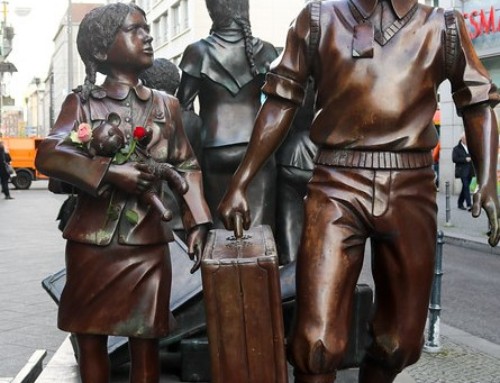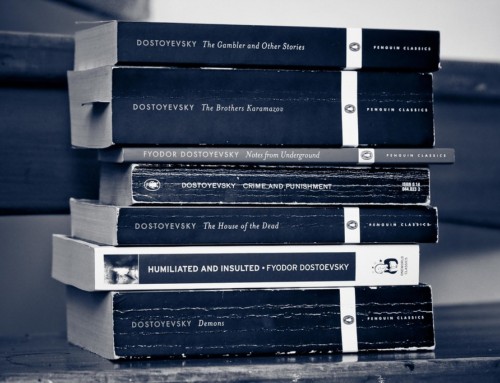Unless you’ve been living some kind of Outlander existence for the last 50 years, you might have caught on that Mormons are big on families.
Traditional ones. One mom. One dad. Some children.
Some people — inside the church, actually — wish we’d shut up about it. We won’t. We don’t think we can afford to.
While speaking up may be our strength, I don’t think we’re all that great at explaining why.
“God said so,” we tell people. It’s probably the best reason of all, as long as people can agree that what God says matters.
“Studies show that . . . ,” we tell people. That’s good, too, but we don’t name any and, besides, even Jif can come up with studies showing that their peanut butter is best.
“Family breakdown will bring foretold calamities,” we tell people. This one only seems to work when you’re preaching to the choir, because the non-choir just thinks you’re trying to scare them. They’ve had it up to their eyeballs with scare tactics.
Better to get your explanations from a Catholic with a PhD.
I don’t know if Charles Murray is Catholic, but he’s a conservative-leaning Harvard/MIT man. His latest book, Coming Apart: The State of White America 1960-2010 sharpens the picture of where we stand as a culture.
His first premise is that we’ve grown a new upper class, now two or three generations deep. It is highly educated and highly successful. Upper-class educations sort people into certain colleges, certain jobs and, eventually, certain neighborhoods. Too many citizens of these neighborhoods never meet anybody that doesn’t dress like them, think like them, or vote like them. They tend to stick with traditional marriage, because it works so well. But they also espouse an “ecumenical niceness” about divorce, single motherhood and more, without any idea how these ideas actually play out in the lives of FedEx drivers, Wal-Mart cashiers, parolees.
Because — you remember — they don’t live anywhere near FedEx drivers, Wal-Mart cashiers, parolees.
Murray’s book leans heavy on numbers and graphs. He won’t get past a certain kind of doubter out there unless he furnishes all this “empirical evidence.” But in between and his percentages and trend lines, he tutors the reader on why the traditional family is so good for society, and what happens (because it’s already happened; he’s got the evidence) when it disappears.
Two samples:
First, quoting Frances Grund, a 19th-century journalist:
“’I consider the domestic virtue of the Americans [their fidelity to marriage] as the principal source of all their other qualities. It acts as a promoter of industry, as a stimulus to enterprise, and as the most powerful restrainer of public vice. It reduces life to its simplest elements, and makes happiness less dependent on precarious circumstances; it ensures the proper education of children, and acts, by the force of example, on the morals of the rising generation; in short it does more for the preservation of peace and good order, than all the laws enacted for that purpose.’”
And Murray himself:
“If one adult man lives with his hard-pressed sister and her family because he can’t manage to hold on to a steady job, that puts a lot of stress on the sister’s family. If many adult men in a community are living off relatives or girlfriends, that puts lots of stress on the community. A man who fathers a child without marrying the mother may be a nice guy who is sorry it happened, and he may be trying to do what he can to help out. But it remains true that only a small minority of unmarried men end up being fathers to their children. Children need fathers, and the next generation in a community with lots of children without fathers is in trouble. People who don’t go to church can be just as morally upright as those who do, but as a group they do not generate the social capital that the churchgoing population generates—it’s not ‘their fault’ that social capital deteriorates, but that doesn’t make the deterioration any less real. The empirical relationships that exist among marriage, industriousness, honesty, religiosity, and a self-governing society mean that the damage is done, even though no one intends it.”
If the subject interests you but the statistics don’t, you can skip the numbers and still get a coherent read through Coming Apart. You will come away wiser and, to my surprise, not completely despondent.
I only wish Murray had named all the towns where the wine-and-cheese set live. I love to take long walks, especially in wine-and-cheese towns.
==========================================
If things are falling apart in America, they aren’t much better in my kitchen, where Sunday dinner didn’t turn out as planned. But I managed to rescue these cookie bars in time, even if my kitchen timer failed to go off.
POLKA DOT SQUARES
1 cup flour
1/2 tsp. baking powder
1/4 tsp. salt
6 TB butter, softened
1 cup firmly packed dark brown sugar
1 egg
1 tsp. vanilla
6 oz. semisweet chocolate chips (1 cup)
1. Preheat oven to 350′. Grease an 8-inch square pan. In a small bowl, combine flour, baking powder, and salt.
2. In a large bowl, beat butter and brown sugar until fluffy. Beat in egg and vanilla with an electric mixer on medium speed until smooth. Add flour mixture and beat on low speed until butter is smooth, scraping down side of bowl frequently with a rubber spatula. Stir in chocolate chips. Turn into prepared pan, leveling surface.
3. Bake 20 to 25 minutes, until a toothpick inserted in center comes out with a few moist crumbs clinging to it. Remove pan to a rack. Let cool completely in pan before cutting into 16 squares.
They are quite a comfort in hard times. Anything containing chocolate chips generally is.
The recipe comes from 365 Great Cookies & Brownies. Or just press your favorite chocolate chip cookie dough into a pan and bake.
And Murray himself:
“If one adult man lives with his hard-pressed sister and her family because he can’t manage to hold on to a steady job, that puts a lot of stress on the sister’s family. If many adult men in a community are living off relatives or girlfriends, that puts lots of stress on the community. A man who fathers a child without marrying the mother may be a nice guy who is sorry it happened, and he may be trying to do what he can to help out. But it remains true that only a small minority of unmarried men end up being fathers to their children. Children need fathers, and the next generation in a community with lots of children without fathers is in trouble. People who don’t go to church can be just as morally upright as those who do, but as a group they do not generate the social capital that the churchgoing population generates—it’s not ‘their fault’ that social capital deteriorates, but that doesn’t make the deterioration any less real. The empirical relationships that exist among marriage, industriousness, honesty, religiosity, and a self-governing society mean that the damage is done, even though no one intends it.”
If the subject interests you but the statistics don’t, you can skip the numbers and still get a coherent read through Coming Apart. You will come away wiser and, to my surprise, not completely despondent.
I only wish Murray had named all the towns where the wine-and-cheese set live. I love to take long walks, especially in wine-and-cheese towns.
==========================================
If things are falling apart in America, they aren’t much better in my kitchen, where Sunday dinner didn’t turn out as planned. But I managed to rescue these cookie bars in time, even if my kitchen timer failed to go off.
POLKA DOT SQUARES
1 cup flour
1/2 tsp. baking powder
1/4 tsp. salt
6 TB butter, softened
1 cup firmly packed dark brown sugar
1 egg
1 tsp. vanilla
6 oz. semisweet chocolate chips (1 cup)
1. Preheat oven to 350′. Grease an 8-inch square pan. In a small bowl, combine flour, baking powder, and salt.
2. In a large bowl, beat butter and brown sugar until fluffy. Beat in egg and vanilla with an electric mixer on medium speed until smooth. Add flour mixture and beat on low speed until butter is smooth, scraping down side of bowl frequently with a rubber spatula. Stir in chocolate chips. Turn into prepared pan, leveling surface.
3. Bake 20 to 25 minutes, until a toothpick inserted in center comes out with a few moist crumbs clinging to it. Remove pan to a rack. Let cool completely in pan before cutting into 16 squares.
They are quite a comfort in hard times. Anything containing chocolate chips generally is.
The recipe comes from 365 Great Cookies & Brownies. Or just press your favorite chocolate chip cookie dough into a pan and bake.








Leave A Comment